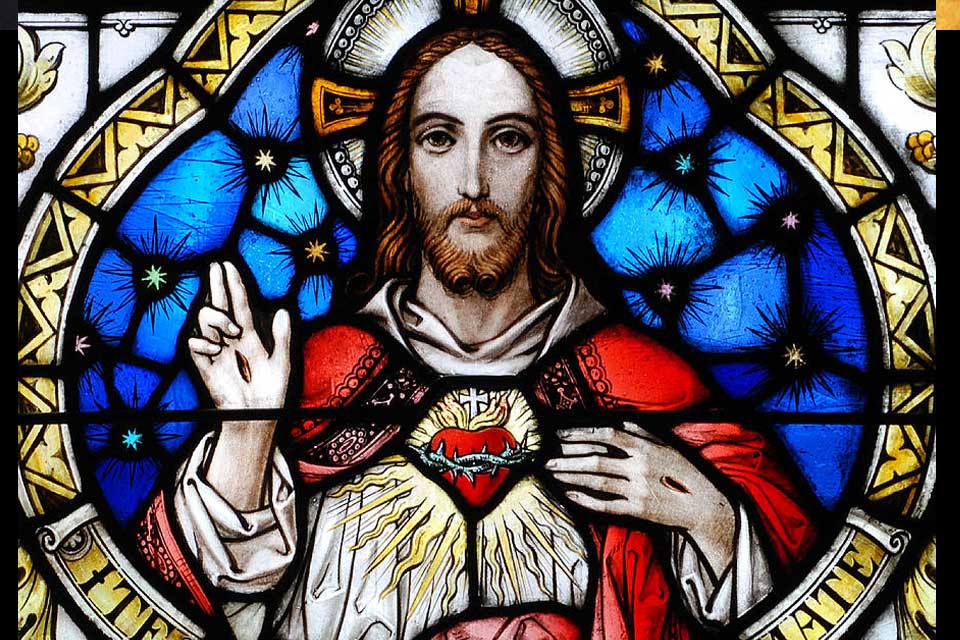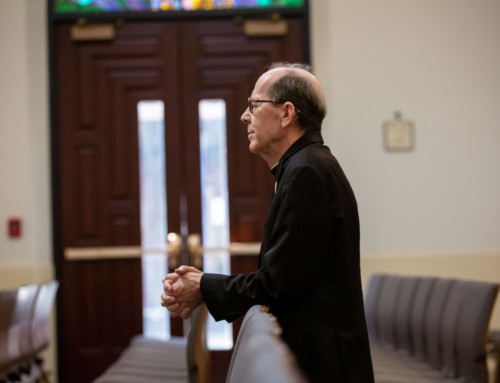Honoring, cherishing, worshipping Christ
The Most Sacred Heart of Jesus
Following is the prepared text for Bishop Olmsted’s homily for the Solemnity of the Most Sacred Heart of Jesus.
June 24, 2022
“I myself will look after and tend my sheep… The lost I will seek out; the strayed I will bring back… the sick I will heal” (Ezek 34:11-16).
In an interview on April 10, 2005, George Weigel made the following observation about what shapes human history:
“…history doesn’t work the way we often suppose. For the past two hundred years, people in the Western world have thought of history as the product of politics — by which they mean the struggle for power, [and] economics — by which they mean the struggle for wealth; or some combination of the two. But … what drives history over the long haul is neither politics nor economics, but culture — what men and women honor, cherish and worship. Change the culture — inspire the culture — and you can bend history in directions that seem impossible on a narrower, political or economic reading of the signs of the times.”
Even though politics and economics have a part to play in shaping society, a much more profound culture is built by what we honor, cherish, and worship. We gather in prayer tonight because we honor, cherish, and worship the Most Sacred Heart of Jesus.
It is a great joy and blessing for me to celebrate this Solemnity of the Most Sacred Heart of Jesus on the historic day when the U.S. Supreme Court overturned Roe v Wade. It is more than a coincidence that it occurred on this great Feast of our Redeemer. What could be more precious to the Heart of Jesus than the lives of the most vulnerable and innocent among us? Roe v Wade led to the destruction of more than 60 million lives while it sowed seeds of confusion in our moral conscience and nation’s laws.
Today we begin the long road to heal from this terrible wound. Dobbs v Jackson put an end to an unjust law that for 49 years has denied tens of millions of children the right to be born. We mourn their loss and entrust their souls to our merciful God. At the same time, we must prepare for the spiritual battle that lies ahead. The Dobbs decision allows us to begin new work: healing wounds and repairing divisions in society, building a culture that supports marriages and families, and offering support and resources for each woman to bring her child into the world redeemed by the pierced Heart of Christ.
The Sacred Heart of Jesus incarnates the love of God for the whole world. The center of the Good News is found in three words: Jesus’ Sacred Heart. How do we know God’s love? How do we experience His love and make it our own except through the humanity of Jesus? Thus, St. Paul writes, in his Letter to the Romans, “…God proves His love for us in that while we were still sinners Christ died for us” (Rom 5:8).
The love of God is amazing. He entices us, attracts us, fascinates us, and captures our imagination in the most unusual ways. The Son of God, the eternal Word of the Father, becomes flesh. Jesus enters the poverty and brokenness of our humanity; He takes on Himself the depravity of our sins. He dies for us on the Cross. Dying, He destroyed our death; rising, He restored our life. This is what transforms a civilization of divisiveness into a civilization of love, a culture of death into a culture of life. The Most Sacred Heart of Jesus shapes human history, including the history of the Servants of the Pierced Hearts of Jesus and Mary, and the history of every one of us.
St. Catherine of Siena begins one of her prayers in this way, “O immeasurable love! O gentle love! Eternal fire! You are that fire ever blazing…” (#9). Throughout her prayers, St. Catherine will break forth in similar exclamations of awestruck wonder: “O boundless, gentlest charity! O Gentle Truth! O first and deep well of charity!”
What Catherine is describing here is the Most Sacred Heart of Jesus. This fountain of God’s love is the reason you and I are here this evening. It is why we worship and adore the Lord with the deepest reverence, gratitude, and praise. But how does the Most Sacred Heart of Jesus get our attention? How does He speak to our hearts and draw us closer to His own? How does He make us eager to love Him in return and to work with Him to build a culture of life?
He leads us into the desert. He hides His beauty “from the wise and the learned” while He reveals it “to little ones.”
Jessica Powers captures well this unusual way God catches the attention of our hearts. In a poem, she writes:
“God is the strangest of all lovers; His ways are past explaining. He sets His heart on a soul; He says to Himself, “Here will I rest my love. But He does not woo her with flowers or jewels or words that are set to music, no names endearing, no kindled praise…
He stalks the soul with sorrows; He tramples the bloom; He blots the sun that could make her vision dim…, and then He comes and there is nothing in the vast world but Him and her love of Him.
Not till the great rebellions die and her will is safe in His hands forever does He open the door of light and His tendernesses fall, and then for what is seen in the soul’s virgin places, for what is heard in the heart, there is no speech at all.
God is a strange lover; the story of His love is most surprising. There is no proud queen in her cloth of gold; over and over again there is only, deep in the soul, a poor disheveled woman weeping… For us who have need of a picture and words: the Magdalen!”
Jesus reminds us of this strange yet deep love of His Sacred Heart when, in today’s Gospel He says, “…there will be more joy in heaven over one sinner who repents than over ninety-nine righteous people who have no need of repentance” (Lk 15:7).
It is God who builds a culture of life. It is all His work. As Psalmist says, “Unless the Lord builds the house, they labor in vain who build it.” But He chooses to do His building through people like you and me, through the “least ones in the Kingdom of God.”
The littler we are, the more we allow God to empty us of pride, the more likely it is that we will not get in the way of the Master Builder. The more our hearts are humbly surrendered to His Most Sacred Heart, the more we honor, cherish and worship Him, the more He will act in us and through us, building a culture of life and a civilization of love, building the Kingdom of God.






